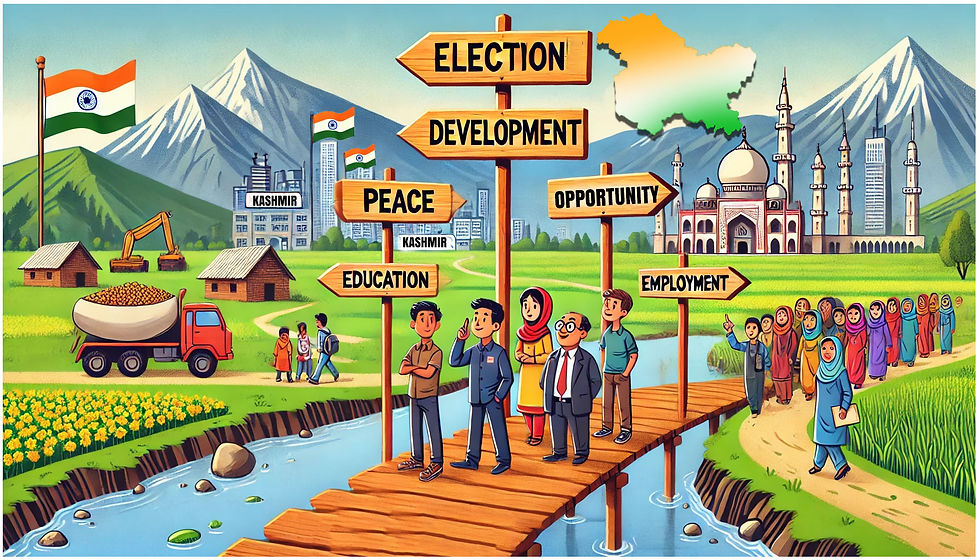
Entrenched dynastic political parties, deep-rooted conflict, and separatist sentiments have long characterised the political landscape of Kashmir. However, recent years have witnessed a notable policy shift, signalling a restructuring of power dynamics in the region. This shift has brought to the forefront issues of accountability, the rise of new political faces, mainstreaming of Kashmiri youth, and its impact on regional and national development.
For a long time, the separatist movement, which had significant public support in the Kashmir Valley, portrayed elections as a futile exercise that sustained an unacceptable status quo. In contrast, locally elected legislators argued that they contested elections to address everyday civic concerns. They maintained that their participation in elections did not impact the broader Kashmir issue, which needed to be resolved by the governments of India and Pakistan. However, New Delhi often used high voter turnout to claim victory over separatists. Over the past five years, though, Jammu and Kashmir has seen increased youth participation in electoral politics, a trend gaining broader social acceptance.
Dynastic political parties have historically dominated Kashmiri politics, perpetuating a cycle of nepotism and corruption. These parties often prioritise personal agendas over the welfare of the people they represent. However, there has been a growing demand for accountability, challenging the hegemony of these entrenched political families. For instance, the Abdullah and Mufti families have long held sway over Kashmiri politics through their parties, the National Conference and the People's Democratic Party, respectively. Yet, allegations of corruption and mismanagement have tarnished their reputations. The public outcry for transparency and accountability has intensified, pressuring these parties to address their shortcomings or face electoral consequences.
In contrast to the dominance of dynastic politics, there has been a notable emergence of new political faces in Kashmir. These individuals represent diverse backgrounds and ideologies, offering alternative visions for the region's future. They have garnered support by challenging the status quo and advocating for genuine grassroots representation. One example is Shah Faesal, a former civil servant who founded the Jammu and Kashmir People's Movement. Faesal's entry into politics symbolises a shift towards a more inclusive and meritocratic political landscape, free from the shackles of dynastic control. His platform resonates with disillusioned voters seeking fresh leadership and innovative solutions to longstanding issues.
One of the most promising developments in Kashmir's political landscape is the increasing mainstreaming of Kashmiri youth. Long marginalised and disenfranchised, young people are now actively participating in political discourse and decision-making processes. This paradigm shift is reshaping the narrative of Kashmiri identity and empowering the next generation of leaders. Examples of young Kashmiris making their mark in various fields, from entrepreneurship to activism, are becoming increasingly prominent organisations like the Jammu and Kashmir Youth Development Forum provide youth engagement and empowerment platforms, fostering a sense of agency and belonging. This newfound inclusivity is crucial for building a more representative and resilient political system in Kashmir.
Restructuring Kashmir's political landscape has far-reaching regional stability and national development implications. Policymakers can address longstanding grievances and work towards sustainable peace and prosperity by promoting accountability, fostering new leadership, and engaging marginalised voices. Moreover, mainstreaming Kashmiri youth is essential for harnessing the region's human capital and unlocking its economic potential. Empowering young people through education, employment opportunities, and political participation is vital to fostering social cohesion and resilience against radicalisation and extremism.
It is imperative to build on the momentum of this policy shift and continue fostering a more inclusive and accountable political environment in Kashmir for the holistic development of the region. This progressive policy shift requires sustained efforts to empower marginalised communities, promote dialogue and reconciliation, and invest in grassroots development initiatives. Furthermore, policymakers must recognise the interconnectedness of Kashmir's political landscape with broader regional dynamics. Cooperation and dialogue between India, Pakistan and Kashmiri stakeholders are essential for addressing longstanding grievances and building a peaceful and prosperous future for the region. It goes without saying that the aspirations of the stakeholders in Pakistan's Illegally Occupied Jammu and Kashmir region also need to be addressed.
the policy shift in Kashmir represents a significant step towards restructuring the region's political landscape. Policymakers can address longstanding grievances and pave the way for sustainable peace and development by promoting accountability, empowering new leadership, and mainstreaming Kashmiri youth. However, achieving these goals will require continued commitment, dialogue, and stakeholder collaboration.

Comentarios